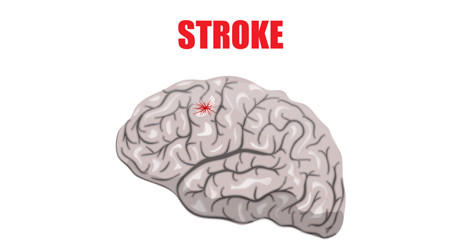A stroke, also called 'Intracerebral Hemorrhage', 'Ischemic Stroke', 'Subarachnoid Hemorrhage', occurs when blood flow to an area in the brain is cut off. The brain cells, deprived of the oxygen and glucose needed to survive, die. If not caught early, a stroke can result in permanent brain damage.
HOW DOES A STROKE OCCUR?
A stroke may be caused by a blocked artery (ischemic stroke) or the leaking or bursting of a blood vessel (hemorrhagic stroke).
Ischemic stroke is similar to a heart attack, except it occurs in the blood vessels of the brain. Clots can form either in the brain's blood vessels, in blood vessels leading to the brain or even blood vessels elsewhere in the body which then travel to the brain. These clots block blood flow to the brain's cells. Ischemic stroke can also occur when too much plaque (fatty deposits and cholesterol) clogs the brain's blood vessels. About 80% of all strokes are of this nature.
Hemorrhagic Strokes occur when a blood vessel in the brain breaks or ruptures. The result is blood seeping into the brain tissue, causing damage to brain cells. The most common causes of hemorrhagic stroke are high blood pressure and Brain aneurysms. An aneurysm is a weakness or thinness in the blood vessel wall.
WHAT ARE THE SIGNS OF STROKE?
The most common symptoms of a stroke are :
- Weakness or numbness of the face, arm or leg on one side of the body
- Loss of vision or dimming (like a curtain falling) in one or both eyes
- Loss of speech, difficulty talking or understanding what others are saying
- Sudden, severe headache with no known cause
- Loss of balance, unstable walking, usually combined with another symptom
Sometimes, people experience warning signs before a stroke occurs. These are called transient ischemic attacks (also called TIA or "mini-stroke") and are short, brief episodes of the stroke symptoms listed. Some people have no symptoms warning you prior to a stroke or symptoms are so mild they are not noticeable. Regular check-ups are important in catching problems before they become serious. Report any symptoms or risk factors to your doctor
WHAT ARE THE RISK FACTORS?
Stroke has many risk factors including :
- High blood pressure (High = greater than 140/90 mm/Hg)
- Atrial fibrillation
- Uncontrolled diabetes
- High total cholesterol ( ³ 200 mg/dL)
- Smoking
- Alcohol (more than one drink per day)
- Being overweight
- Existing carotid and/or coronary artery disease
- Uncontrollable Risk Factors
- Age (>65)
- Gender (Men have more strokes, women have deadlier strokes)
- Race
- Family History of Stroke
Your doctor can evaluate your risk for stroke and help you control your risk factors.
HOW TO PREVENT A STROKE?
Age makes us more susceptible to having a stroke, as does having a mother, father, or other close relative who has had a stroke. You can't reverse the years or change your family history, but there are many other stroke risk factors that you can control :
- Lower Blood Pressure: High blood pressure is a huge factor, doubling or even quadrupling your stroke risk if it is not controlled.
- Lose Weight: Obesity raises your odds of having a stroke. If you're overweight, losing as little as 10 pounds can have a real impact on your stroke risk.
- Exercise More: Exercise contributes to losing weight and lowering blood pressure, but it also stands on its own as an independent stroke reducer.
- Treat Atrial Fibrillation: Atrial fibrillation is a form of irregular heartbeat that causes clots to form in the heart. Those clots can then travel to the brain, producing a stroke
- Treat Diabetes: Having high blood sugar damages blood vessels over time, making clots more likely to form inside them.
- Quit Smoking: Smoking thickens our blood, and it increases the amount of plaque buildup in the arteries.
If you think, you have any of the risk factors; contact a doctor to evaluate yourself. If you are experiencing any of the symptoms or signs, get medical help immediately.
